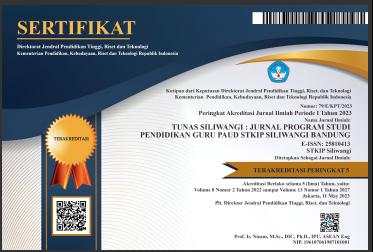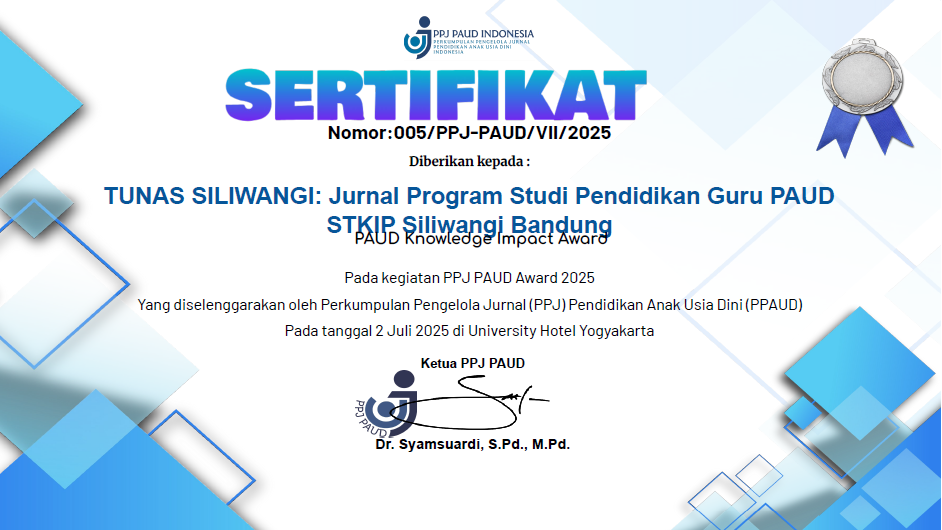PENGUKURAN DAN PENGARUH KINERJA GURU RA (RAUDLATUL ATHFAL) BERPRESTASI
DOI:
https://doi.org/10.22460/ts.v7i2p%25p.1671Abstract
This research was conducted to measure the performance of RA teachers with high performance and to determine the influence factors of their performance using a qualitative method with a psychological approach that was carried out directly on the subject under study, in order to obtain all data related to the performance of outstanding teachers. Data collection uses interviews, documentation, and observation. Data analysis techniques include reducing data, presenting, drawing conclusions and verifying. Data validity test is done by triangulation techniques.
The research succeeded in revealing that the performance measurement of RA teacher achievement through six dimensions (namely: quality of work, speed/ accuracy, initiative in work, work ability and communication), as well as two strategies in developing the performance of RA teacher achievement (ie: training and performance motivation). Furthermore, there are two factors that affect performance, first internal factors within the individual teacher, in the form: physical (healthy body) and psychological (attention, intelligence, interests, motives, talents, readiness and maturity). These internal factors are N. Ach or Need for Achievement, which are drive, motive, or need for achievement. The two external factors, which are from outside the individual. This can be in the form of environmental conditions, ranging from the school environment, family, and community environment, to the facilities and infrastructure.References
Arikunto, Suharsimi. dan Lia Yuliana. (2012). Manajemen Pendidikan. Yogyakarta: Aditya Media.
Barnawi. dan Mohammad Arifin. (2014). Kinerja Guru Profesional: Instrumen Pembinaan, Peningkatan, & Penilaian. Yogyakarta: Ar-Ruzz Media.
Byars, Lloyd L. dan Leslie W. Rue. (2003). Human Resource Management. Singapore: McGraw-Hill.
Chang, M.C. 2010. “Supporting Teacher Reform in Indonesia†Makalah dipresentasikan dalam Kongres Guru Indonesia. Jakarta: 2 Mei.
Mahmud, M. Dimyati. (1990). Psikologi Pendidikan Suatu Pendekatan Terapan. Yogyakarta: BPFE UGM.
Moleong, Lexy J. (2005). Metodologi Penelitian Kualitatif. Bandung: Remaja Rosdakarya.
Noe, Raymond A. John R. Hollenbeck., Berry Gerhart & Patrick M. Wright. (2014). Human Resources Management. Singapore: McGraw-Hill.
Peraturan Pemerintah Republik Indonesia Nomor 74 Tahun 2008 Pasal 30 ayat (1)
Rakhmat, Jalaluddin. (2004). Rindu Rasul. Bandung: Rosdakarya.
Sinambela, Lijan Poltak. (2012). Kinerja Pegawai: Teori Pengukuran dan Implikasi. Yogyakarta: Graha Ilmu.
Slameto. (2003). Belajar dan Faktor-faktor Yang Mempengaruhi. Jakarta: Rineka Cipta.
Undang-undang Republik Indonesia Nomor 14 Tahun 2005 tentang Guru dan Dosen, Pasal 36 ayat (1)
Undang-undang RI nomor 20 tahun 2003 pada ayat (2) poin c pasal 40.
Uno, Hamzah B. dan Nina Lamatenggo. 2012. Teori Kinerja dan Pengukurannya. Jakarta: Bumi Aksara.
Zainuddin. dkk. (1991). Seluk Beluk Pendidikan al-Ghazali. Jakarta: Bumi Aksara.
Downloads
Published
Issue
Section
License
Copyright (c) 2025 Fu`ad Arif Noor

This work is licensed under a Creative Commons Attribution-ShareAlike 4.0 International License.
The author is responsible for acquiring the permission(s) to reproduce any copyrighted figures, tables, data, or text that are being used in the submitted paper. Authors should note that text quotations of more than 250 words from a published or copyrighted work will require grant of permission from the original publisher to reprint. The written permission letter(s) must be submitted together with the manuscript.






